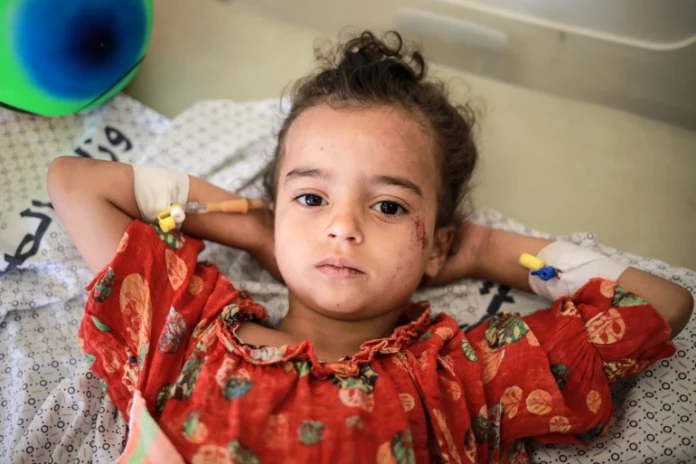Gaza City: Amina Ashkinan’s grandchildren were playing in front of their house at Jabalia refugee camp in the northern Gaza Strip on Saturday when an Israeli strike came from the sky.
Her granddaughter, 10-year-old Mayar, was hit by shrapnel in the abdomen. Her grandson, nine-year-old Ahmed, got injuries all over his body. Both children were rushed to Shifa Medical Complex in Gaza City, just two of the dozens of Palestinians to be transported to the main hospital in the Gaza Strip during Israel’s latest bombardment of the besieged enclave.
Mayar was immediately taken to the operation room. Her condition, along with that of her brother, has since stabilised but Ashkinan is still worried.
For days, Palestinian health officials had been issuing warnings of an imminent stop in the provision of medical services due to the lack of fuel needed to operate the electricity generators in hospitals and health facilities across Gaza. The Strip’s only power plant had shut down on Saturday, days after Israel stopped the planned transport of fuel into the territory.
“The situation is so sad and unimaginable,” Ashkinan, 65, said at the hospital. “No human being can bear what we bear – from the war going on against us, the defenceless civilians, or from the constant power cuts or the running out of fuel?
“What is our fault, and what is the fault of our children, for all this to happen to them?”
‘A real catastrophe’
At least 15 children were among the 44 people killed in the Gaza Strip in three days of Israeli bombardment, according to Palestinian health ministry officials. Late on Sunday, Israel and the Palestinian Islamic Jihad armed group declared a truce that appeared to be holding on Monday morning.
Mohammad Abu Salmiya, Shifa’s director, said the collapse of the health sector was an inevitable result of the 15-year Israeli blockade imposed on the Strip.
Now, he added, the electricity crisis only came to exacerbate the sector’s woes, paralysing all departments and especially the intensive care unit, the oxygen-generating stations and nurseries.
“There are more than 25 injuries who need surgeries; there are wounded in intensive care departments in critical conditions, and there are children, women and the elderly who are injured,” he told Al Jazeera on Sunday.
“The numbers indicate the excessive use of force in the Israeli bombing. There are injuries that require medical interventions from different specialities,” Abu Salmiya said, warning that the health sector faced “a real catastrophe” if Israel renewed its offensive.
“We are at a very critical stage.”
‘We are very tired’
In another room in Shifa, Suad al-Bis lies on her back. The five-year-old girl was wounded on Saturday when an Israeli strike hit an empty plot of land next to her family home in the Bedouin village of Beit Hanoon, known as Erez to Israelis, in the northern Gaza Strip.
“Because of [how heavy] the bombardment [was], my granddaughter fell on her stomach with such force that it directly affected her spleen,” said her grandmother, Suad, 56.
The girl was initially transferred to Kamal Adwan Hospital in northern Gaza, before being taken to Shifa due to the complexity of her condition and the medical shortages there.
“The doctors reassured us that her condition is finally stable,” said the grandmother. “But there is still a concern that she will be able to eat and drink and will be kept under observation,” she added.
“The doctors here are doing everything they can to help the wounded, but the weakness of the capabilities and the pressure of the cases hinder them.”
“We are simple people; we were sitting in our homes safely, and [in] every war we are subjected to displacement and bombing. We are very tired.”
‘A death sentence for us’
The Israeli bombardment of Gaza was the worst since an 11-day war in May last year that killed more than 260 Palestinians and wounded some 2,000 others.
The latest onslaught began on Friday, when Israel launched what it said was a “preemptive” operation against Islamic Jihad. Palestinian observers said the attack was weeks in the making by the Israeli government, calling it a deliberate act to gain legitimacy ahead of new elections in November.
“It was a normal day when we had lunch, until we heard a huge explosion; then the walls of the house collapsed on us,” said Ahmed Abu Ramadan, the brother of Islam Abu Ramadan, who was wounded on Friday when Israel struck an apartment next to theirs in residential Palestine Tower in Gaza City.
“It was a very traumatic moment. I carried my sister, and I was screaming to save my father and mother,” recalled Ahmed, 23.
Islam sustained injuries to her hand, face and body. Her parents were also moderately injured and are still under medical care.
“Stopping medical services for the wounded in these circumstances is a death sentence for us and all the residents of the Gaza Strip,” Ahmed said.
“The situation is unbearable, and we are still in a very difficult psychological state. When will the world move to end the injustice against the people of the Gaza Strip?”


